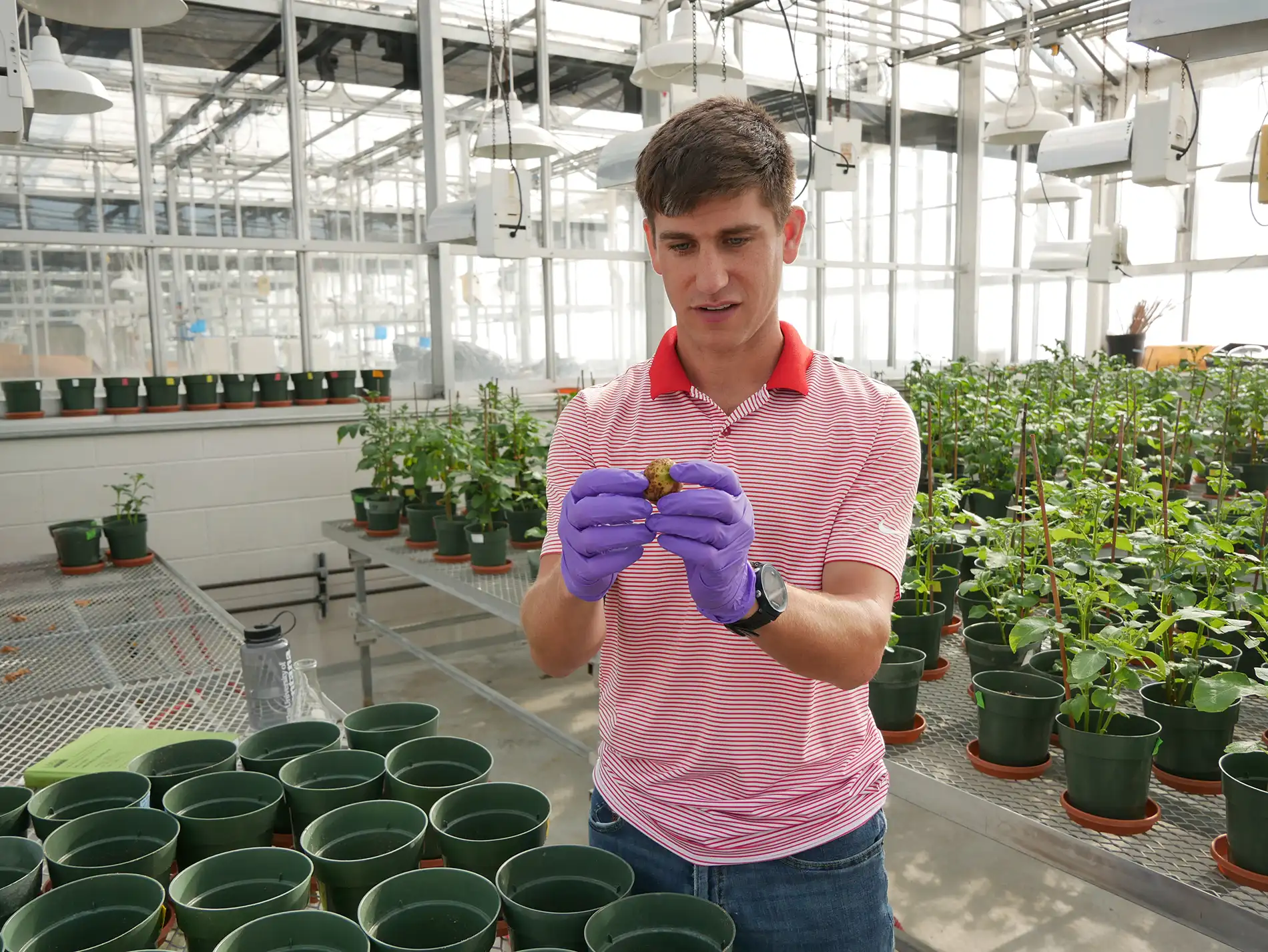USDA-ARS fellow researches the cause of common scab disease on potatoes
Meet Brett Shelley

Brett Shelley, Ph.D., gained his interest in the sciences at an early age, but credits part of his success to the great mentors he has had along the way. (Photo Credit: Hannah Keller)
Brett Shelley’s, Ph.D., interest in science all started with eggshells and influential mentors. Growing up on a small farm in Pennsylvania, Shelley participated in a science fair and was encouraged by his high school mentors, Michele Dubiach and Jodi Fry, to develop his research project and present at the local Intel Science Fair. After expanding upon his high school research for three years, he decided to study poultry science before changing his focus to environmental law with the hopes of working in Washington, D.C., someday. It wasn’t until his undergraduate professor at Hood College suggested majoring in biology where he found his calling to study plant science. He took their advice and four years later began doing research on biocontrol of invasive weeds in Frederick, Maryland. Professors Kathy Falkenstein, Ph.D., and Oney Smith, Ph.D., served as vessels of encouragement throughout graduate school at Hood College where he studied the effects of temperature on germination of oomycete pathogens with Tim Widmer, Ph.D., with the United States Department of Agriculture (USDA) Agricultural Research Service (ARS). Later, Shelley furthered his interest in plant biology at Virginia Tech under the guidance of Guillaume Pilot, Ph.D., studying how plants transport amino acids from roots to leaves, before landing him where he is today.
After learning about the Zintellect website from a friend, Shelley found an opportunity with a mentor, Christopher Clarke, Ph.D., that he knew from previous conferences and as a fellow Virginia Tech alumnus and decided to reach out. Now, Shelley is an Oak Ridge Institute for Science and Education (ORISE) postdoctoral fellow with the USDA-ARS in the Genetic Improvement of Fruits and Vegetables lab group.
The USDA ARS Research Participation Program provides opportunities for students, postgraduates, established scientists and faculty to participate in programs, projects and activities at ARS-designated facilities to help ARS solve agricultural problems of high national priority.
Shelley’s current research project is focused on understanding how several species of Streptomyces cause common scab disease on potatoes. Specifically, he wants to study a phytotoxin, Thaxtomin A, and why some strains of Streptomyces are more aggressive than others. Shelley is using molecular diagnostics (qPCR) to measure the abundance of the pathogenic gene to understand how different bacteria grow under different conditions.

Shelley’s research aims to understand the tremendous, growing diversity of pathogenic Streptomyces species and explore the mechanisms for infection to design novel control methods against the pathogen. (Photo Credit: Brett Shelley)
“Common scab is a major problem across the potato growing regions of the country leading to unmarketable tubers,” Shelley said. “The purpose of the research is to understand the tremendous, growing diversity of pathogenic Streptomyces species and explore the mechanisms for infection and design novel control methods against the pathogen.”
With potatoes being an important crop, the disease can cause devastating effects for both consumers and farmers. The disease presents no symptoms until farmers go to harvest and discover the tubers covered with large scab-like lesions which are rejected by the processors. Shelley’s research aims to understand how the bacterium infects the tuber and develop diagnostic assays that can help inform planting and management decisions.
A typical day for Shelley depends on what experiments he’s starting or finishing. If starting or collecting data, he will prep materials and mentor the student-researchers in the lab. For longer incubations, he transitions to analyzing the data, writing manuscripts, finishing up any lab work and running scripts.
It’s so much fun being a part of a collaborative group that encourages young scientists to pursue research interests and bridge the gaps between your expertise and your advisor’s expertise to work toward finding new areas of research. I enjoy the ability to learn new techniques that are different from my Ph.D. and apply them to study tough questions in science.
Shelley has had the opportunity to publish research, participate as a Co-Principal Investigator for several grants and develop novel research areas he can carry into his next career step. Just a couple of his publications include “Description of Streptomyces griseiscabiei sp. nov. and reassignment of Streptomyces sp. strain NRRL B-16521 to Streptomyces acidiscabies” in the International Journal of Systematic and Evolutionary Microbiology and “The role of soil abundance of TxtAB in potato common scab disease severity” in Phytopathology.
“It’s so much fun being a part of a collaborative group that encourages young scientists to pursue research interests and bridge the gaps between your expertise and your advisor’s expertise to work toward finding new areas of research,” Shelley said. “I enjoy the ability to learn new techniques that are different from my Ph.D. and apply them to study tough questions in science.”
After the completion of his fellowship, Shelley hopes to obtain a research scientist position with the USDA-ARS or become a faculty member at a land-grant research university. His goal is to develop a research program that addresses fundamental issues that are important to American agriculture. Until then, Shelley enjoys running, cycling and coaching athletes to qualify for the Boston Marathon all while his family refers to him as “Dr. Spud” and “Mr. Potato-head”.
The USDA ARS Research Participation Program is funded by USDA and is administered through the U.S. Department of Energy’s (DOE) Oak Ridge Institute for Science and Education (ORISE). ORISE is managed for DOE by ORAU.

